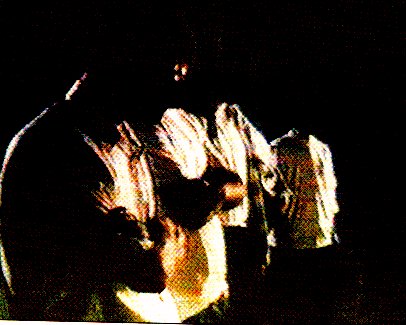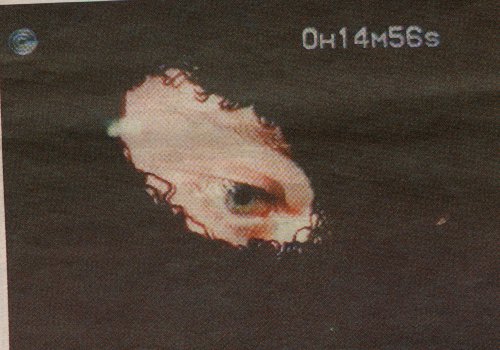

"The Israel Government Announces in Shock"
Channel Two's Incitement Documentary: Manipulative Propaganda !
- A -
"Israel's Media Watch" organization demands that Channel Two not screen a particular segment of the movie "The Government Announces with Shock" when it screens it next week.
The newly-released film purports to document the "campaign of incitement" against the government in the months that preceded the assassination of the late Prime Minister Yitzchak Rabin.
It was initiated and financed by the same source that published ads blaming Binyamin Netanyahu for the death of Yitzchak Rabin.
The segment to which "Israel's Media Watch" objects is one showing Shabak-agent Avishai Raviv swearing-in new young members to the militant organization Eyal. However, the movie does not indicate that the scene, which was originally screened on Channel Two, was actually staged, and that Raviv was a Shabak (Security Service) agent.
 Staged
Eyal swearing-in ceremony by GSS agent provocateur Avishai Raviv.
Staged
Eyal swearing-in ceremony by GSS agent provocateur Avishai Raviv.
 Pictures
pulished in newspaper Makor Rishon 31.10.97 (Many Thanks).
Pictures
pulished in newspaper Makor Rishon 31.10.97 (Many Thanks).
In a letter to Channel Two's Director-General, "Israel's Media Watch" claims that a documentary film cannot include such scenes without clarifying those critical points. (Adapted from Arutz7 news.)
- B -
14 May 1997
"The Israel Government Announces in Shock" Israel's Media Watch denounces the lack of journalistic ethic of M. Karpin's film in "Uvda"
On Tuesday evening, May 13, 1997, a privately funded and produced film purchased by the Telad Broadcast Company, entitled "The Israel Government Announces in Shock", was transmitted on Israel's Second Television Channel . The film, shown in the prestigious "Uvda" ("Fact") slot, was presented as a documentary. Its director is Michael Karpin, its executive producer, David Moshevics, its producer Orna Yarmus and the editor is Amit Azaz.
Following a press conference conducted the previous Wednesday, it became obvious that the film was highly controversial. After viewing the 42-minute television version (there are two other versions of 60 and 90 minute lengths), the following observations were made:
1. The film presented not one documentary piece of evidence to support any of its claims. There were shots and interviews with several of the personalities which the film claimed did certain actions or filled certain positions but none of them were asked to confirm or deny any of the charges the film made. Some persons refused to be interviewed but the film does not make this clear. Nowhere was there any paper evidence or any other objective, independent corroborative testimony to back up its claims. The film was less a documentary than cheap propaganda and was made with malice aforethought.
2. The central motif of the film was that there was a causal link between the demonstrations against the Rabin government's policies and the assassination of Rabin. Indeed, the first suggested title for the film, admitted Michael Karpin, was "Who Killed Yitzhak Rabin?". This claim of the film was purportive and unproved. Since Yigal Amir, the killer, admitted stalking Rabin as early as January 1995 after even earlier deciding that Rabin needed to be killed, obviously any demonstration after that time was irrelevant to the film's thesis.
Furthermore, not any renowned sociologist or psychologist have ever declared or suggested (of course !) that it could be a link between anti-governmental demonstrations and the cool reflexion and decision of Y. Amir to kill Yitshak Rabin.
On the other hand, the continuous incitement of Avishai Raviv (the secret service agent provocateur) pushing and pushing Y. Amir to kill Y. Rabin was not at all mentioned.
3. The film was not representative of the atmosphere of incitement that existed at the time nor did it define the term "incitement" (for example, was a sign calling Rabin a "liar" incitement or was it someone spitting on Rabin's picture on the poster?). It did not include Rabin's own inflamatory statements (such as accusing Netanyahu of being a "Hamas collaborator"); did not include any of Netanyahu many exhortations to the crowds to desist chants of "Rabin is a traitor"; did not deal in any shape or form with the GSS agent provocateur Avishai Raviv; did not bring statements of Arutz 7's Adir Zik calling on demonstrators to be careful and not to be violent while bringing other statements; did not include any extensive footage of the Arab terror which brought out the angry crowds; did not show any of the police violence which caused angrier crowds to react.
Theus, the film was imbalanced and manipulative.
4. The film did, however, include scenes of Rechavam Zeevi a full year (!) after the assassination in Hebron in a confrontation with IDF soldiers as if this proved his link to the Rabin assassination. In addition, an infamous clip of a Eyal Organization swearing-in ceremony first broadcast on Channel One in September 1995 was shown. This clip was the subject of a police investigation, suspected of being staged following a criminal complaint lodged by Israel's Media Watch. The State Attorney's office has been reticent on the charge for over 15 months. Although warned not to include the clip, the producers ignored the request as well as the demand to at least label the scene as under police investigation.
The scenes showing a reenactment of Amir's activities the night of the assassination were accompanied by Church music as if he was hearing heavenly voices. All of Karpin's questions were formulated in the most provocative way as statements rather than questions.
5. The film also includes a statement by Karpin while strolling in Zion Square that "Rabin's death sentence was made here in Zion Square" referring to the poster picture, the size of an A-4 sheet, of Rabin in an SS uniform (Karpin has also carefully avoided to precise that the picture of Rabin in SS uniform has been made by the same secret service agent provocateur Avishai Raviv -look paragraph n°9). To remind you, Amir had already, by this time, twice approached Rabin with a gun, intent upon killing him.
6. Karpin, the film's director, was severely criticized in March 1995 by the State Comproller, former Supreme Court Judge Miriam Ben-Porat. His coverage of complaints against her office were imbalanced in the extreme, she noted, and sought exclusively negative information, ignoring contrary data. She said that he was very unfair and intimated that Karpin was representative of bad television reporting. This was not the first time that Karpin, a veteran TV investigative reporter, was criticised.
David Moshevics was a early supporter of Peace Now and after the Rabin assassination set up an association called "Never To Forget" which published ads against Prime Minister Netanyahu, quoting the Biblical admonition: "Have you Killed and also Inherited?".
7. One of the other claims in the film is that Channels One and Two did not cover the intensity of the incitement at the time and he needed to go to foreign film archives. Both news directors, Rafik Halaby and Shalom Kital, hotly dispute this claim.
8. On Wednesday, May 14, the TV media issue program, "NoMan's Land" discussed the film. Dr. Ilan Avisar, Tel Aviv University lecturer on cinematic art, said that from a professional level the film was "garbage". Both Karpin and poet Yitzhak Leor (who wrote a poem 16 years ago that "settlers used Palestinian blood to bake matzot") burst out saying that the term "garbage" coming from Avisar was a bullying tactic and was indicative of the same kind of incitement the film was highlighting.
9. On that same program, Channel One's Nitzan Chen demanded of Karpin to explain why he had ignored the Avishai Raviv story. Karpin, who prided himself and staff for their eight month research effort, refused to answer. Raviv had actually given N. Chen the infamous Rabin S.S. poster and pestered him to make sure he held it up to the cameras that night in October 1995.
11. The film showed a holiday camp (kaitana) where
extremist right-wing religious "youngster from the settlements were
trained to use guns in order to learn how to hit the arabs" !! In
fact, the camp was also organized and staged by the agent provocateur Avishai
Raviv and filmed by an TV staff.
 Agent
provocateur Avishai Raviv. (Picture from Newspaper Makor Rishon, 31.10.1997)
Agent
provocateur Avishai Raviv. (Picture from Newspaper Makor Rishon, 31.10.1997)
 Agent
provocateur Avishai Raviv. (Picture from Newspaper Makor Rishon, 31.10.1997)
Agent
provocateur Avishai Raviv. (Picture from Newspaper Makor Rishon, 31.10.1997)
10. The film used many times the known propaganda "tricks" of linking together independant items (for instance, Ariel Sharon with the SS poster and so on).
11. Nachman Shai, Second TV Authority Director only received the video cassette copy of the Karpin film on the morning of the broadcast. By law, he is encharged with reviewing material and to judge if it fits legal obligations of media ethics.
Although he decided not to make use of the authority granted him, he noted in his letter to Telad director, Uzi Peled, that:
"in the film there are portions, and there is a general trend/motif that could possibly not comply with the obligation of balance... the fact that the film was purchased from an outside source must be emphasised at the outset as well as the fact that it was produced by politically idenified elements...there is also the possibility that the Law of Libel may be violated...and that certain persons may have been injured...".
Material prepared by Yisrael Medad as a private, unaffiliated individual.
Israel's Media Watch is a non-partisan advocacy group concerned with the ethical and professional standards of the media in Israel.
Return to Home Page
Return to List of Papers
This page hosted by Geocities![]() Get
your own FreeHome Page
Get
your own FreeHome Page